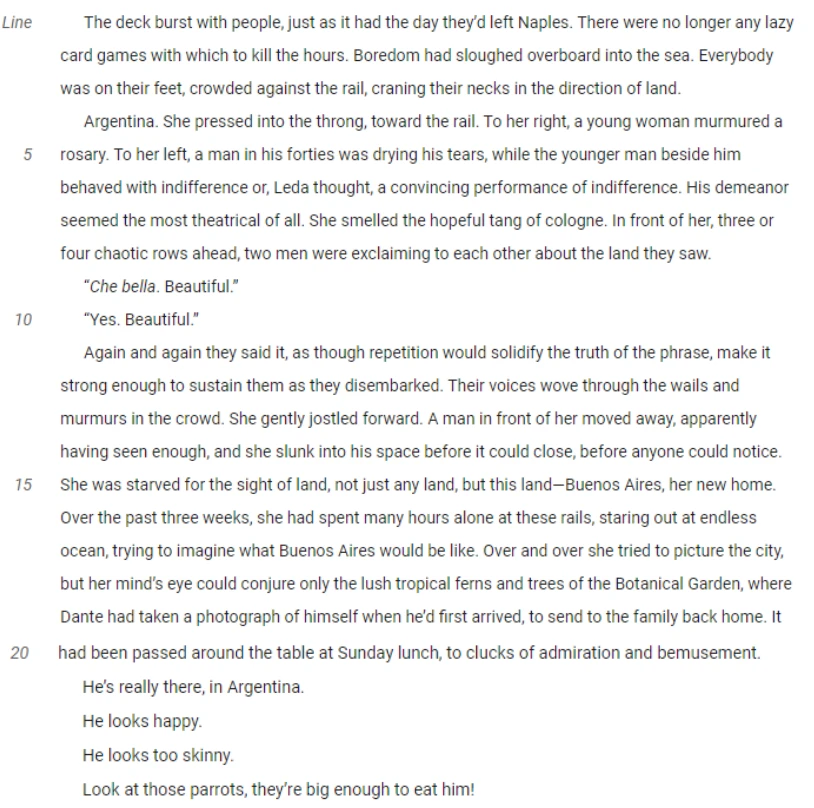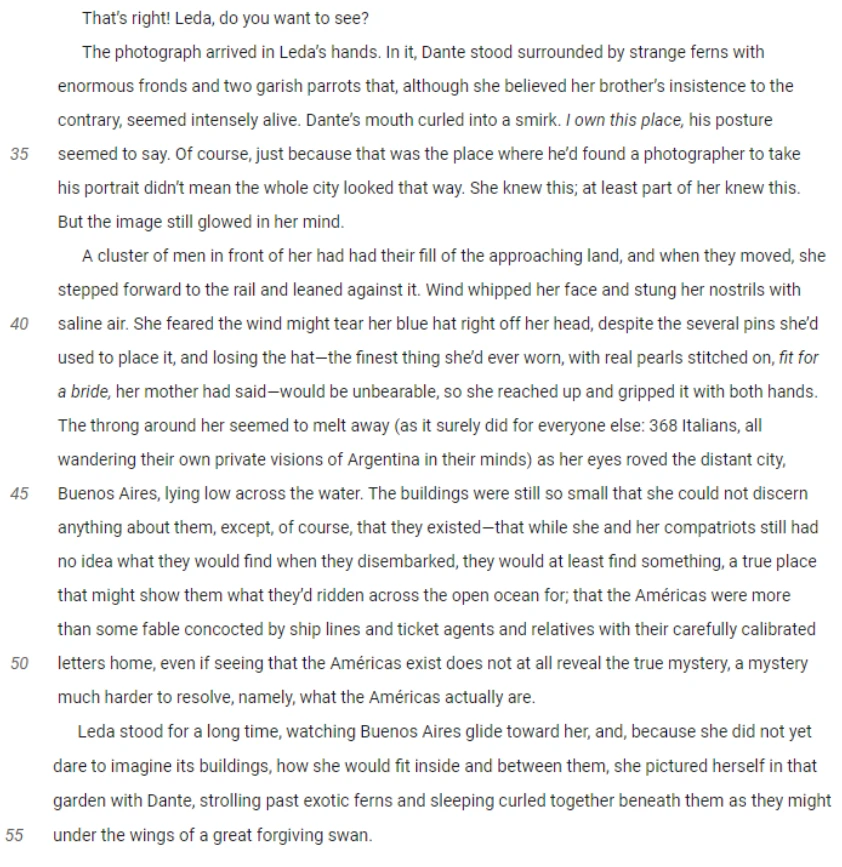Section: Reading and Writing 0 Likes
This passage is adapted from Carolina De Robertis, The Gods of Tango (May 2023 U.S.)
Questions 1-10 are based on the following passage. This passage is adapted from Carolina De Robertis, The Gods of Tango.
©2015 by Carolina De Robertis.
Leda is traveling by ship from Italy to Buenos Aires, Argentina, to live with her new husband, Dante. It is 1913.



1 - The passage indicates that parts of the journey from Naples to Buenos Aires have been
A) hazardous.
B) tedious.
C) disheartening.
D) perplexing.
2 - As used in line 12, “wove” most nearly means
A) intermingled.
B) formed.
C) invented.
D) folded.
3 - Based on the passage, which statement best describes Leda’s attitude about moving to Argentina?
A) Leda longs to arrive in her new country even though she has little concept of what awaits her.
B) Leda looks forward to starting a new life with Dante even though she will miss her family.
C) Leda is initially curious about living abroad but becomes nervous after leaving her homeland.
D) Leda is uncertain about moving but feels reassured after seeing Dante’s photograph.
4 - Which choice best supports the idea that the photograph of Dante prompts Leda to consider his mindset?
A) line 17-19 (“Over . . . home”)
B) line 19-20 (“It had . . . bemusement”)
C.) line 29-31 (“No fighting . . . see”)
D) line 34-35 (“Dante’s . . . say”)
5 - As used in line 37, “glowed” most nearly means
A) radiated heat.
B) remained vivid.
C) provided light.
D) gained intensity.
6 - The phrase in parentheses in line 43-44 (“as it . . . minds”) mainly serves to
A) emphasize the similarities between Leda’s initial impressions of Argentina and those of the other passengers.
B) convey the passengers’ growing confidence in what the future holds for them.
C) highlight that Argentina represents something unique to each passenger.
D) note that Leda feels disconnected from the other passengers despite being surrounded by them.
7 - The passage most strongly suggests that Leda’s distant view of the buildings on the Argentinian coast
A) awakens her excitement at having finally fulfilled her dream to travel abroad.
B) reinforces her sense of her ignorance about the realities of her new life.
C) ignites her determination to help her husband improve his business.
D) underscores her disappointment with the urban location of her new home.
8 - According to the passage, the accounts often told about the Américas are
A) healing, because the accounts promise comfort to travelers escaping hardships.
B) instructive, because the accounts provide travelers with suggestions for how to succeed.
C) misleading, because the accounts present travelers with a portrayal that is not necessarily accurate.
D) discouraging, because the accounts suggest the degree of adjustment facing travelers may be greater than they anticipated.
9 - It can reasonably be inferred from the passage that for Leda, the garden in the photograph mainly represents
A) a reassuring daydream in the face of an uncertain future.
B) a revealing indication of the amenities commonly found in Buenos Aires.
C) an unexpected confirmation that her hopes for her new life will be fulfilled.
D) an impressive sign of her husband’s achievements in Argentina.
10 - Which choice provides the best evidence for the answer to the previous question?
A) line 32-34 (“In it . . . alive”)
B) line 35-36 (“Of course . . . way”)
C) line 36-37 (“She knew . . . mind”)
D) line 52-55 (“Leda . . . swan”)
Solution
Correct answer:
1 - B
2 - A
3 - A
4 - D
5 - B
6 - C
7 - B
8 - C
9 - A
10 - D
Exam Edition: May 2023 U.S.
Exam Year: 2023
Related topics: Words in context, Reading, Text Comprehension